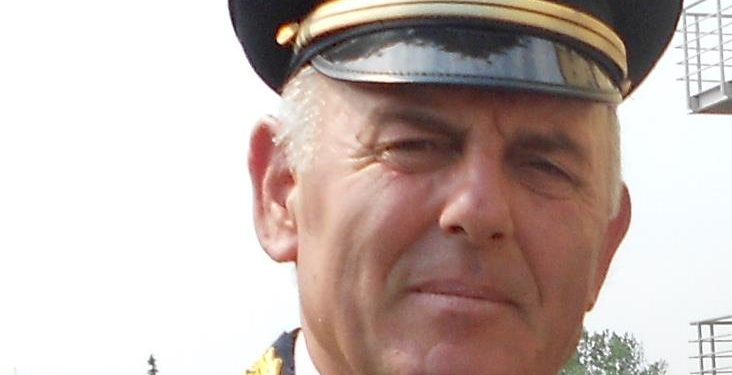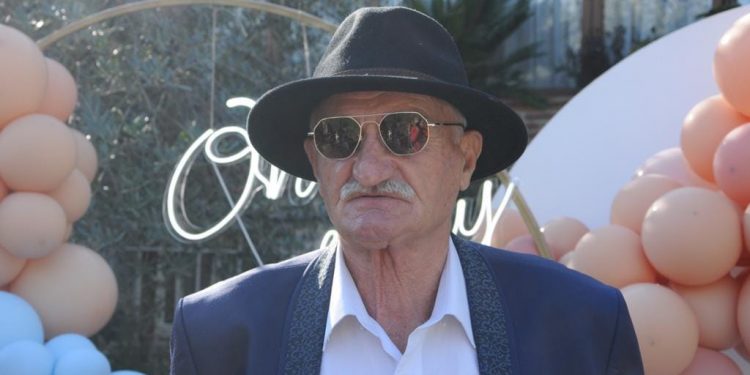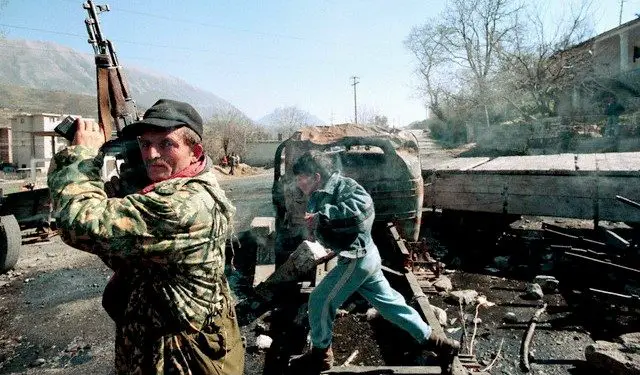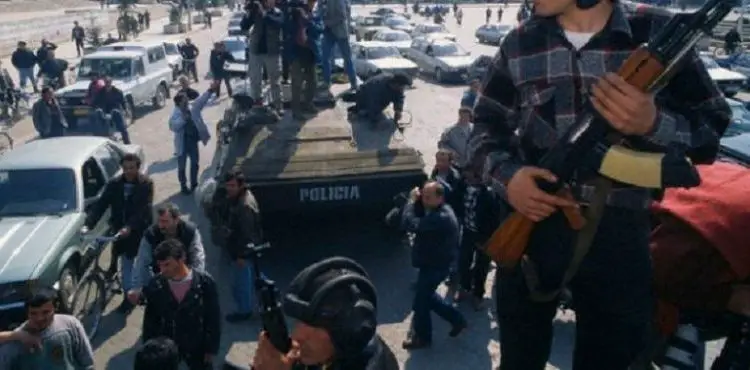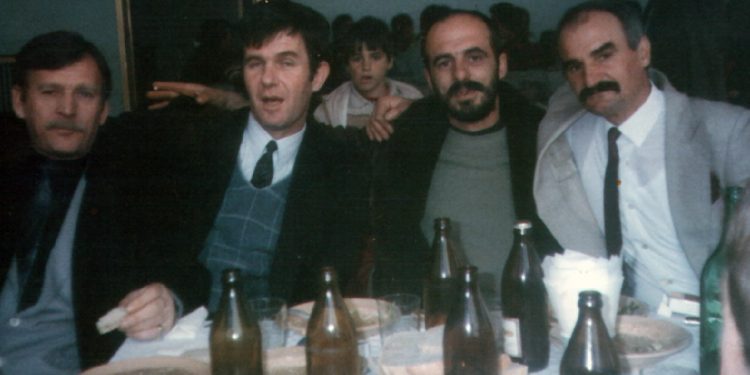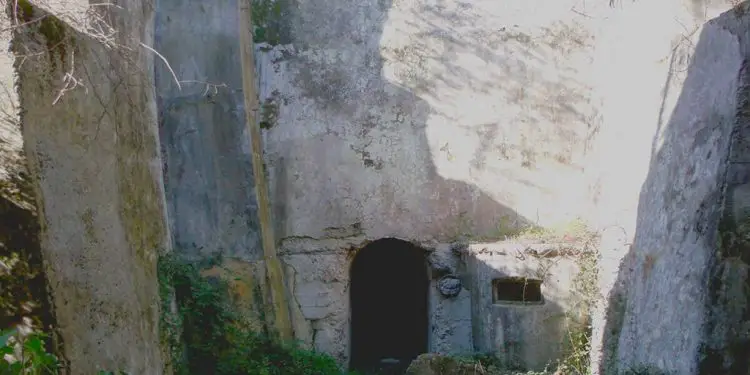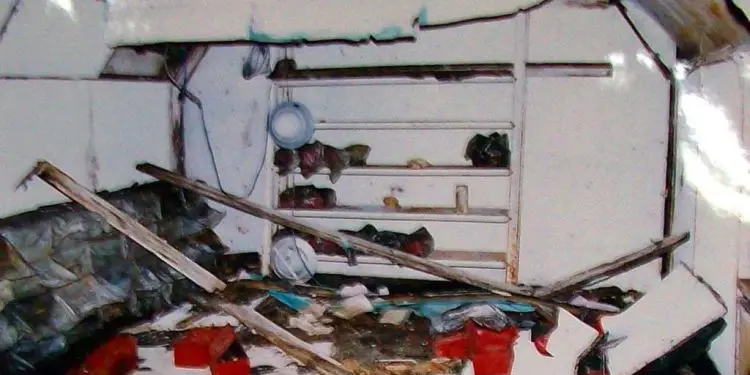Dashnor Kaloçi
Memorie.al publishes the unknown story that happened in February 1997, when armed groups attacked with weapons the object of special importance in the village of Linza on the outskirts of Tirana, where the ‘State Treasury’ was guarded, which was protected by two units’ special forces of the Ministry of Order of that time, which were deployed near him. Rare story of retired lieutenant colonel Shik Stërmasi, former political prisoner for 15 years in the communist regime of Enver Hoxha, who in 1997, in the position of commander of the Special Unit of the Rapid Intervention Forces, (Unit 7011 ), together with the effective and his two subordinates, Colonel Skënder Doda and Major Pëllumb Kovashica, fought for 12 hours against armed groups that tried to enter the tunnels of the facility where foreign exchange reserves were kept, otherwise known as the State Treasury. …!
Shpëtimi or Shiku as it was otherwise known before the ’90s, comes from an old autochthonous Tirana family who have lived for several centuries near the capital’s New Bazaar near “Avni Rustemi” square. Shiku was born in 1949 and was the last of three sons and two daughters by Ramazan Stërmasi, who graduated in Electrical Engineering in Vienna, Austria during the Zog Monarchy. During the years of the Kingdom and during the War, Zani worked as deputy director of “SITA”, the private company that supplied electricity to the capital. In ’46 Zon Stërmasi was arrested along with a group of intellectuals, who were accused of being agents of Harry Fultz and initially sentenced to death, then to 14 years in prison, but was released after four years was considered a “victim of Koci Xoxa”, the then Minister of Internal Affairs, whom Enver accused of being an enemy of the people and shot him.
After prison, Ramazon worked for a long time at the Ulza and Shkopet Hydropower Plants and then returned to Tirana, ending his career as an electrical engineer at the Electro-Mechanical Enterprise. Because of Ramazon’s political imprisonment (as well as that of his father-in-law, Isuf Çela, who died in Burrel Prison in 1954), none of his children were fortunate enough to attend high school. Even Shiku, after graduating from the “Çajupi” gymnasium in Tirana, started working in the Electro-Mechanical Enterprise, continuing his school without leaving his job in the Electrical branch.
In the late ’60s, Shik Stërmasi became one of the most famous boys in Tirana, both because of his portrait and physique, as well as the adventures of his age. All those who have known Shikun in those years, remember him as a charming boy who dressed well and followed fashion (clothes were put on him from outside) and as a very peaceful man who spent most of his time, being taken with pigeons. But he is also remembered as a brave boy, who did not get bored even of the strongest in Tirana, when it came to making a friend or a defenseless girl his god!
While Shiku was at the height of his “adventures”, in 1976, he was arrested by the State Security, sentenced to 9 years in prison, accused of “agitation and propaganda” and the reason for his arrest became his brother. the great, the Lion, who since 1960, had fled Albania and was in the West. While serving his sentence, Shiku was re-sentenced to another 10 years, being released from prison only in January 1991, when the democratic process had just begun.
After the 1990s, or more precisely at the end of 1992 when the Democratic Party had just come to power, together with a small group of former political prisoners, Shik Stërmasi was called to work in the Ministry of Internal Affairs. , as an officer in the ranks of the State Police, initially serving as Chief of Commissariat in Tirana, Kurbin, Elbasan, etc., until as Commander of the Special Unit of the Rapid Intervention Forces in Tirana, with the rank of lieutenant colonel, where he his contribution, until 1998.
The events of the bad year 1997, or of that extremely turbulent period of time that a young poet has defined: “The time when 3 million Albanians declared war on heaven”, continue to be told today as legends that happened centuries ago and not a little more than two decades ago. One of those events which has remained unknown to this day (about which no line has been written) is that of the armed attack on the State Treasury tunnels, which were then located on the outskirts of the capital in the village of Linza.
But what was in those tunnels, who attacked them and who defended them? For all this he introduces us with his exclusive interview for Memorie.al, retired lieutenant colonel, 73-year-old Shpëtim Stërmasi, former commander of the Rapid Intervention Unit, who protected that object of very special importance, from a robbery its possibility, if it had happened, would have brought about the financial bankruptcy of the Albanian state…!?
Mr. Stërmasi, how do you remember the event when the State Treasury was attacked in Linza?
Towards the end of February 1997, a few days after the riots broke out caused by the bankruptcy of the pyramid schemes, together with the weapons depots located in the military units, an attempt was made to break and loot the object of special importance, the Treasury State. At this time, having information that the ward where the State Treasury tunnels were located (the facility where the State Bank banknotes are kept) would be attacked to be robbed, which was covered with service by the forces of Unit 324 (Security Battalion of Ministry of Order) which was located very close to ‘Unit 711’ (Rapid Intervention) that I commanded, I decided to guard at all costs that object of special importance, as ‘Unit 324’, could not provide it.
So, you did it on your own initiative and not because one of your superiors in the Ministry of Internal Affairs asked you to?
In a way yes, that is the truth.
And how did you act after you decided to protect that particular object?
The day before that event took place, I took precautions, deploying three well-armed police officers at all heights and neuralgic points around and around our ward and that of the Treasury. That day around 2 o’clock in the afternoon, I, with 10-15 subordinate police officers of mine, went out on the field around the ward to do the reconnaissance, as I had signals that as soon as it got dark the big weapons tunnels of Ward 324 would be attacked. After checking all the guard posts, we also entered some premises near our ward, where there were some armed persons, known as a crime contingent and with criminal records for the State Police.
When you entered the bar did you have confrontations with those people?
In a bar, I told them, “If you were trying to attack, I would plant you all in the ward yard.” After that, they tried to take me for granted, saying: “Everyone has released him, but why are you holding him… ?!”
How did you respond?
I reacted harshly immediately, threatening them by saying, “Try it at dinner, it will hold you,” and I left for the ward.
What measures did you take after you went to the ward?
There I immediately gathered all the staff, officers and police and informed them of the situation we were in, bluntly telling them that: from time to time our unit could be attacked. In the end I told them who could not resist, was free to leave the ward and whoever wanted to stay with me, as we would fight to the end to defend him.
How did your staff react after that, was there anyone who asked to leave?
To tell the truth, some even left, as they had been previously injured in some interventions made by our unit in Lushnje, Fier, Vlora, etc., but most of the troops remained ready to fight there. After a few minutes as soon as it got dark, groups of armed contingents started coming near our unit, who started firing at us with automatic weapons, to pressure us to leave the unit.
How did you react after being shot from outside with a gun?
After that, the guard officer, Colonel Skënder Doda, responded with fire and from that moment, there started a real fight with bursts of automatic weapons that fired incessantly from all sides in the direction of our unit.
Did you inform your superiors at the Ministry of Internal Affairs that they were being attacked and did you ask for help?
I immediately contacted General Agim Shehu, (who at that time was the General Director of the State Police and at the same time, the Deputy Minister of Public Order, telling him to send forces, to strike from behind those who had surrounded.
How did General Agim Shehu respond to your request?
He replied: “Face the situation yourself, because here in the Ministry I have only Nikolin Thana, Cezar Toron and Lul Shala”, who were my accomplices, former convicts in the prisons of the communist regime of Enver Hoxha.
What did you do after that, when the help you asked for was denied?
After making sure that reinforcements would not come to us, accompanied only by officers Skënder Doda and Pëllumb Kovashica, I left the ward, moving from one guard post to another. Those two highly trained officers were really brave and did not leave me for a moment even though the bullets were whistling over our heads. We concentrated our forces mainly on the tunnels where the ‘State Treasury’ was located, where it was the main target of those who attacked us, and throughout the night we kept them about 250-300 meters away. Two or three times they approached about 150 meters close, but we repulsed them.
How many hours of fighting did you put up to protect your ward and the State Treasury tunnels?
The war continued all night without rest and we have spent thousands of bullets to protect objects of special importance, such as the Treasury and arms tunnels. The war lasted about 12 hours and ended only at dawn there around 6.00, when they left for fear that they might be dictated or that reinforcements might come to us.
What did you do after those who attacked you left?
After the gunfire stopped and we saw that those who attacked us were leaving, me and Skënder and Pëllumbin, who did not leave me for a moment, and some other policemen, checked all the hills around, seeing that had been injured by their side. After making sure that there was nothing from us or them, we returned to the ward where I gathered the staff thanking and congratulating her for the resistance she had made. After making sure that the situation had calmed down, he left for the Ministry of Order, reporting everything that had happened to General Agim Shehu.
Did he praise you for what you had done?
That event was considered quite common and he said to me: “Congratulations, you have done your duty”.
But then when the situation calmed down and order was restored, did you receive thanks for what you had done in defense of the State Treasury?
Not only did we not receive thanks, but the socialists who came to power, looked at us as enemies and until they forced us to leave our job they called us salists./Memorie.al




